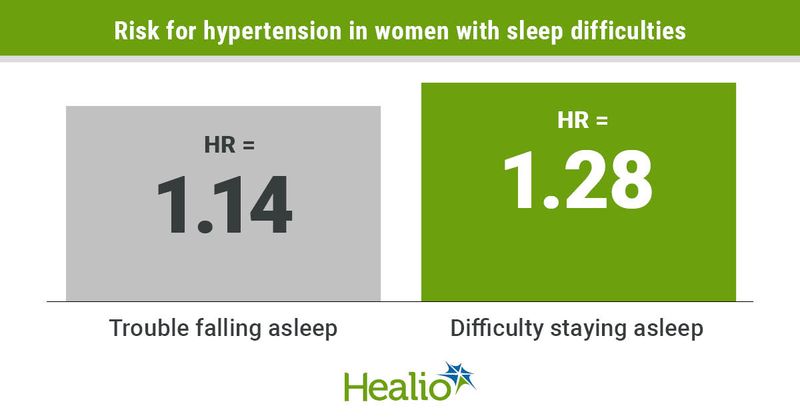Blood
Insomnia, short sleep tied to high blood pressure risk for women
October 06, 2023
2 min read
Source/Disclosures
Published by:
Disclosures:
The authors report no relevant financial disclosures.
Key takeaways:
- Short sleep, difficulty falling asleep and staying asleep all drive hypertension risk for women.
- Sleep screenings could identify people at higher risk for hypertension.
Women who reported sleep difficulties or sleeping less than 6 hours per day were more likely to develop hypertension compared with women who slept 7 to 8 hours, with shift work not affecting the association, researchers reported.
“Both sleep difficulties and hypertension are very prevalent conditions,” Shahab Haghayegh, PhD, a research fellow at Brigham and Women’s Hospital and Harvard Medical School, told Healio. “Based on the American Academy of Sleep Medicine, 30% of Americans experience insomnia symptoms, whereas 45% of U.S. adults live with high BP. Also, research showed that sleep time BP is highly associated with future adverse health outcomes. Given these findings, we were interested to see if people with sleep difficulties or short sleep duration are at higher risk of developing hypertension.”
Haghayegh and colleagues analyzed data from 66,122 participants of the Nurses’ Health Study II without hypertension at baseline (2001) who were assessed for hypertension every 2 years during 16 years of prospective follow-up.
Researchers assessed sleep duration in 2001 and then again in 2009 by querying the average hours of sleep during a 24-hour period. Response categories were 5 hours or less, 6 hours, 7 to 8 hours, 9 hours or more than 9 hours. Sleeping difficulties were assessed in 2001, 2013 and 2017.
Researchers estimated HRs for hypertension incidence associated with sleeping difficulties and sleep duration.
The findings were published in Hypertension.
During follow-up, researchers documented 25,987 incident cases of hypertension.
Compared with women who reported sleeping 7 to 8 hours, women with shorter sleep duration had a higher risk for hypertension, with an HR of 1.1 for 5 hours or less (95% CI, 1.05-1.16) and an HR of 1.07 for 6 hours (95% CI, 1.03-1.1). Women who reported longer sleep duration of 9 hours or more did not have a statistically significant increase in hypertension risk.
Compared with women rarely having difficulty falling or staying asleep, women who reported they sometimes or usually had sleep difficulties had higher risk for developing hypertension, with an HR of 1.14 for those who had trouble falling asleep (95% CI, 1.11-1.17) and an HR of 1.28 for those who had difficulty staying asleep (95% CI, 1.22-1.35; P for trend < .001).
Researchers did not observe an association between early morning awakening and hypertension risk (P for trend = .722), and there was no effect modification by night work or chronotype.

Shahab Haghayegh
“While I anticipated discovering a connection between shorter sleep duration and an increased risk of developing hypertension, it was astonishing to find that this association persisted even after adjusting for sleep difficulties,” Haghayegh told Healio. “This implies that individuals who may not experience challenges in falling asleep or staying asleep but still fail to obtain an adequate amount of sleep (less than 7 hours) are at an elevated risk for developing hypertension.”
The researchers noted that clinicians should increase efforts to screen for sleeping difficulties to identify people at higher risk for hypertension.
“While this study examined the association between sleep and hypertension, it’s essential to note that our findings do not imply causality,” Haghayegh told Healio. “An area warranting further investigation is determining whether sleep difficulties are indeed a causal factor in the development of hypertension and if addressing sleep problems could potentially yield a beneficial impact on BP.”
For more information:
Shahab Haghayegh, PhD, can be reached at [email protected].

